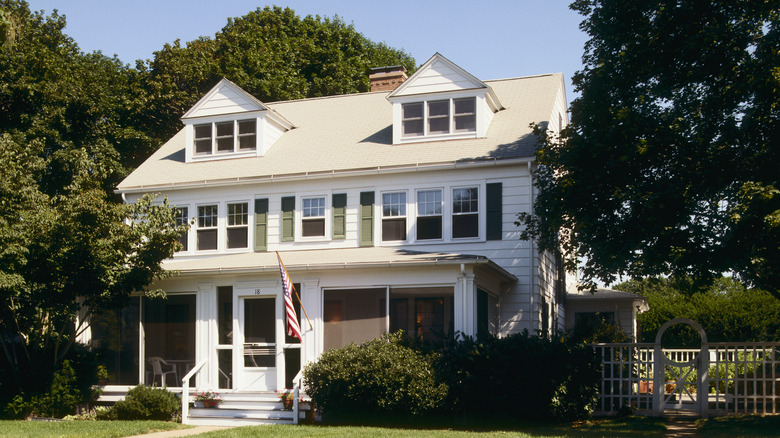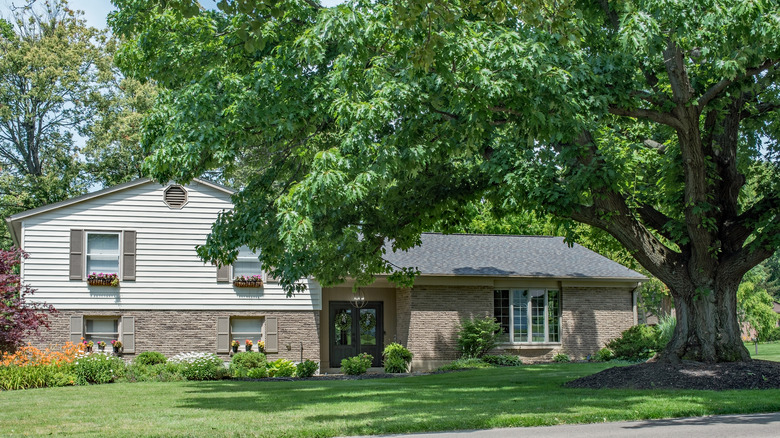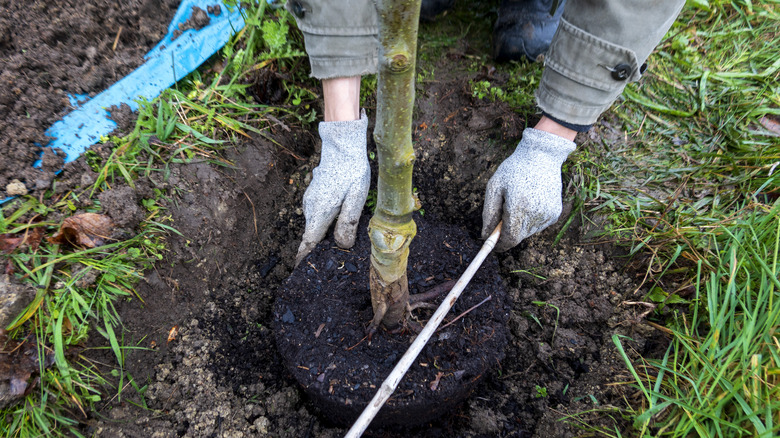Common Shade Trees That Can Help Lower Your AC Bill In The Summer
If your AC bill spirals out of control every summer, one of the best things you can do to lower it is plant a shade tree or two. When planted in the right spot, shade trees can cut a home's heating and cooling costs by up to 25%. That's a bigger savings potential than you'd get from air sealing and insulating your home, which the EPA estimates would trim 15% off of your heating and cooling costs.
Some of the most common shade trees in the United States that homeowners use to lower their AC bill include Ash (Frazinus pennsylvanica), Beech (Fagus grandifolia), Elm (Ulmus Americana), Eucalyptus (Eucalyptus cinerea), Red Maple (Acer rubrum), Honey Locust (Gleditsia triacanthos), and Willow Oak (Quercus phellos). These are typically fast-growing trees that will have a wide canopy at maturity and require little maintenance.
Many are also deciduous so the broad canopy of leaves will shade your house to help keep cooling costs down in summer. Come winter, the leaves drop to allow sunlight through that can help warm your house. At the same time, the trunk and bare branches serve as a windbreak to block chilly winter winds from reaching your home. To maximize the cooling effect, you should learn more about the characteristics and needs of each species to pick the perfect shade tree for your yard. Then, plant them where they can shade the west- and south-facing walls of your home so they're blocking sunlight during the hottest parts of the day.
Popular shade trees for your yard
Ash, Beech, Elm, Eucalyptus, Red Maple, Honey Locust, and Willow Oak are popular shade trees for good reason. They develop wide, spreading crowns — between 50 and 80 feet wide, depending on species — that block sunlight from different angles and typically reach their mature height quickly so you'll get the shade you need sooner. With that said, some species may be a better fit for your yard than others.
For hot climates, the best options are Willow Oak, Ash, Elm, or Eucalyptus — all of which are heat tolerant. The Ash and Elm are especially good choices for fire-prone areas while the Willow Oak is a better choice for hot and humid regions. For colder climates, the most cold-hardy species on this list is the Red Maple. However, any species except the Eucalyptus and Willow Oak can survive in colder climates, up to zone 3a.
If you live in a city, an Elm, Red Maple, or Willow Oak will be the most tolerant of urban conditions, including pollution and poor soil. For coastal areas where salt and wind are a problem, the Honey Locust will thrive best, but it can be a vigorous spreader, so gardeners will have to weed out new seedlings regularly to keep it contained. For a lower maintenance alternative on the coast, Ash, Beech and Eucalyptus are also suitable choices. Note that all parts of the Eucalyptus tree are toxic to humans and pets when ingested.
Tips for planting a shade tree in your yard
The best way to successfully grow a shade tree is to pick the right species and the right spot in your yard. The first step is to call 811 — if located in the U.S., Canada or Puerto Rico — so you can find out where utilities like sewage pipes or gas lines are buried in your yard. Doing this before you even buy a tree ensures you can choose a tree and location based on where you can safely plant it.
Splurge on a larger tree if you can, so that it can reach a shade-giving height faster. But note that larger trees can be more susceptible to transplant shock since they typically lose a higher percentage of their root system when being dug up for transplant compared to smaller trees with smaller root systems. You can reduce the risks of transplant shock by planting new trees in fall or winter so they can develop a stronger root system while they're dormant.
While most of the trees mentioned above can adapt to a wide variety of conditions once established, transplant shock is more likely if you're planting a tree somewhere that doesn't meet its ideal soil, light or moisture conditions. If you know the site you have in mind won't be ideal, consider choosing a Willow Oak, Ash, Red Maple, or Elm. All of these transplant more easily than other species.


